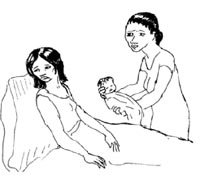5.3.2 When the mother isn’t interested in her baby
Some mothers do not feel good about their new babies (Figure 5.10). There can be many reasons for this. The mother may be very tired, or she may be ill or bleeding. She may not have wanted a baby, or may be worried that she cannot take care of one. As you learned in Study Session 3, she may be very depressed: signs of this are if the woman seems sad, quiet, and has no interest in anything. Also watch for other signs of abnormal behaviour which are different from her usual way of behaving.

What to do if you are concerned about a mother’s lack of interest in her baby:
- Check her carefully for signs of blood loss or infection, or a hypertensive disorder. She may be ill, rather than depressed or anxious.
- You might talk to the mother about her feelings, or you may feel it is better to leave her alone, and to watch and wait.
- If you know that she was seriously depressed after a past birth, talk to the family about giving her extra attention and support in the next few weeks. Usually this depression passes in time, but sometimes it takes a few weeks or even months, and you may need to refer her for additional assessment and treatment. If she demonstrates any of the signs of postpartum psychosis (Box 5.1), refer her urgently.
- Make sure someone in the family takes care of the new baby if the mother cannot or will not.
![]() Postpartum psychosis can be life-threatening, so treat it as an emergency. You will learn more about psychosis in the Module on Non-Communicable Diseases, Emergency Care and Mental Health.
Postpartum psychosis can be life-threatening, so treat it as an emergency. You will learn more about psychosis in the Module on Non-Communicable Diseases, Emergency Care and Mental Health.
Box 5.1 Signs of postpartum psychosis
This condition is rare (affecting about one in 1,000 women), but it is very serious and the mother should be referred urgently for specialist treatment if she is experiencing any of the following symptoms:
- Hearing sounds or voices when no-one is there
- Seeing things that are not real
- Feeling as though her thoughts are not her own
- Feeling afraid that she might harm herself or her baby
- Rapid weight loss and refusal to eat
- Going without sleep for 48 hours or more.
5.3.1 Fathers and other family members can help
